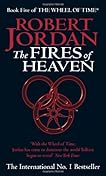 Mat, Egwene, even Moiraine sometimes looked at him with eyes that saw the Dragon Reborn, or at least the danger of a man who could channel. The clan chiefs and the Wise Ones saw He Who Comes With the Dawn, the man prophesied to break the Aiel like dried twigs; if they did not fear him, they still sometimes treated him like a red adder they had to live with. Whatever Aviendha saw, it never stopped her being scathing whenever she chose, which was most of the time.
Mat, Egwene, even Moiraine sometimes looked at him with eyes that saw the Dragon Reborn, or at least the danger of a man who could channel. The clan chiefs and the Wise Ones saw He Who Comes With the Dawn, the man prophesied to break the Aiel like dried twigs; if they did not fear him, they still sometimes treated him like a red adder they had to live with. Whatever Aviendha saw, it never stopped her being scathing whenever she chose, which was most of the time.An odd sort of comfort, but compared to the rest, it was a comfort nonetheless.
Author: Robert Jordan
Synopsis: Rand leads the Aiel against Couladin and his followers, who have murdered and destroyed their way from the Aiel Waste to Cairhien. His work is complicated by Darkhounds and Draghkar, plotting from Lanfear and Sammael, Asmodean—from whom Rand is trying to learn safe use of the One Power—and Rand's own touchy relationships with Moiraine’s guidance and the honor of the Maidens of the Spear.
As he works, one of the Forsaken tries to take over the throne of Andor. Mat tries, once again, to escape destiny. And Nynaeve and Elayne join a traveling circus to escape Elayne’s half-brother Galad, the Whitecloaks, and another member of the Forsaken, who wants vengeance against Nynaeve.
Notes: When you’ve spent 3500 five-hundred-word pages with an author, repetitive phrases get more than a little noticeable. I’ll confess to getting a bit bored with Nynaeve’s braid-pulling, the Rand/Perrin/Mat unspoken assumption that each of the others relates better to women, and the number of cultures that dress more risqué than the Women’s Circle in the Two Rivers would ever stand for.
On the other hand, I’m constantly amazed at Jordan’s worldbuilding. He doesn’t miss a note—the characters think in terms of their world and culture, whether it be Rand’s farm and forest idioms or Thom's Game of Houses experience or Aviendha’s ji’e’toh (honor and obligation). I’ve never seen anyone do a better job of this.
The perspective shifts were more comfortable in this book than in the last, but I must say that I hate being in bad characters’ minds. Hate it. Padan Fain, in particular, makes my skin crawl. There are arguments for the value of showing that perspective, but I have a strong visceral reaction to sharing the mind of anyone who celebrates evil.
As for the good characters, I’m chalking up Egwene’s concern over Rand’s arrogance to unreliable narration. I just didn’t see him as arrogant. Maybe I’m biased because I get to share his mind, but he seems to me to be doing the best he can given his circumstances.
Nynaeve was a lot of fun in this book. I got a kick out of her circus experiences, and found her troubles with Birgitte sympathetic and fascinating.
I’m also interested to see where Gareth Bryne and Siuan Sanche go from here.
I haven’t made my mind up whether I like Aviendha yet. She’s shocking, stubborn, and the show-your-love-by-bluster thing has never really been my way. She also refused to let Rand make the amends his conscience demanded for what happened between them. But she feels she must return him safely to Elayne, so we'll see where all that goes.
Without getting into spoilers—near the end, a character I've really liked meets her death. It’s something I’ve suspected was coming for awhile, but it hit me pretty hard anyway. The nobility of the sacrifice and Rand’s grief over it made for one of the most touching scenes in the book.
The tale closed, as usual, with battle and victory and a couple of unresolved threads to make the reader want book six. Which, of course, I immediately had to reserve at the library.
Recommendation: If you’ve made it this far, there’s no turning back. At least, not here.
No comments:
Post a Comment
All comments are currently moderated. Friendly comments are welcomed with fairy music, magic wishes, and possible unicorn sightings. Troll comments will be Transfigured into decent-looking rocks or Vanished. Spam comments will be shot down with blasters.